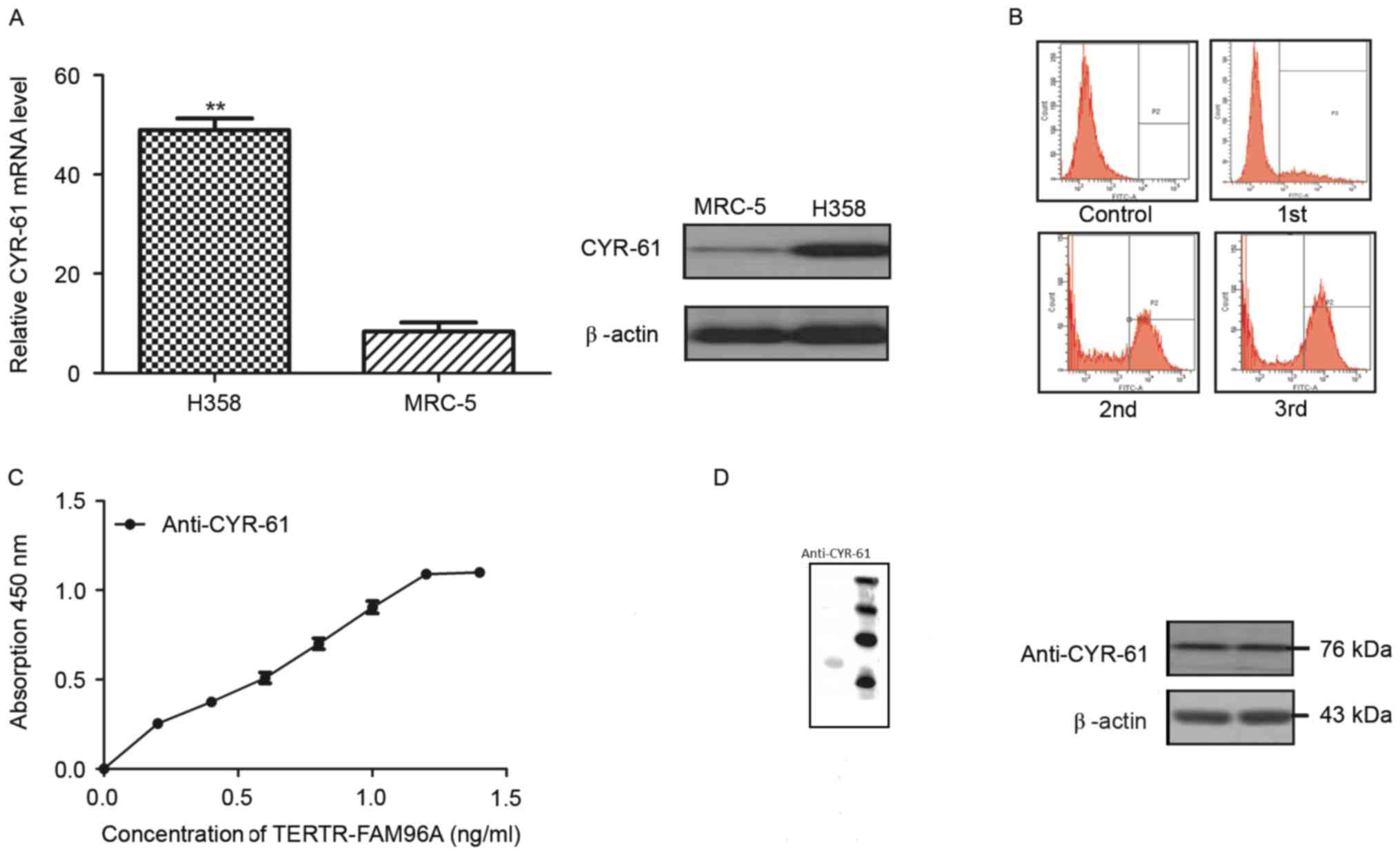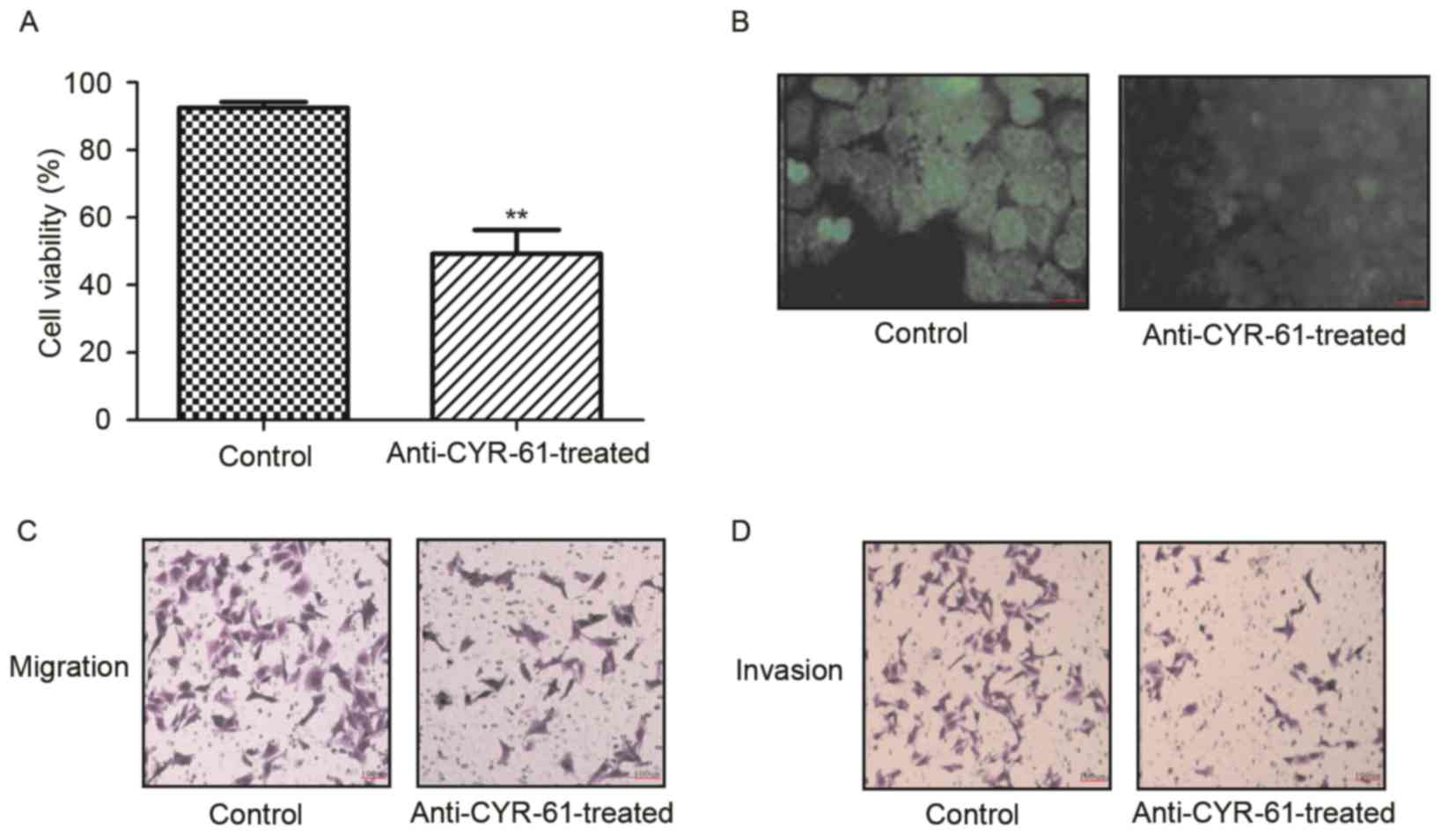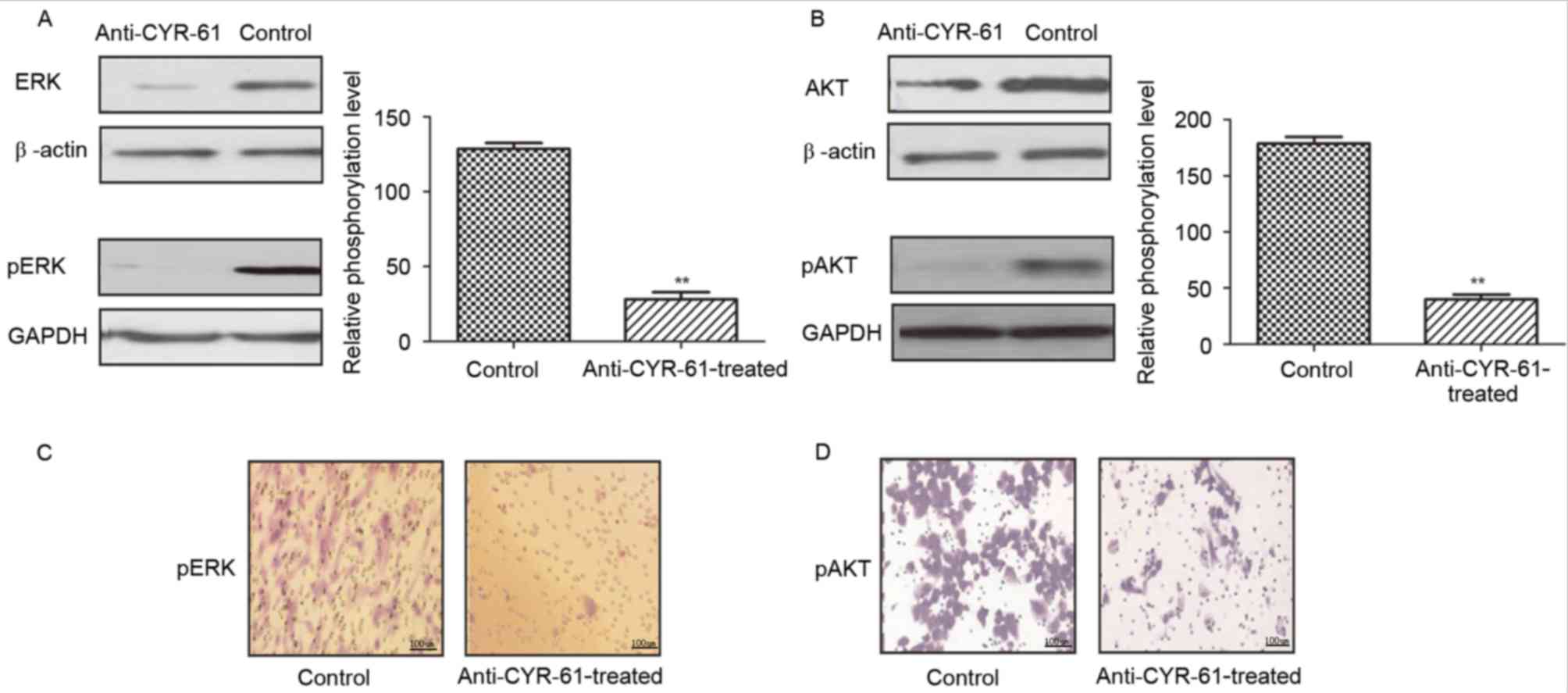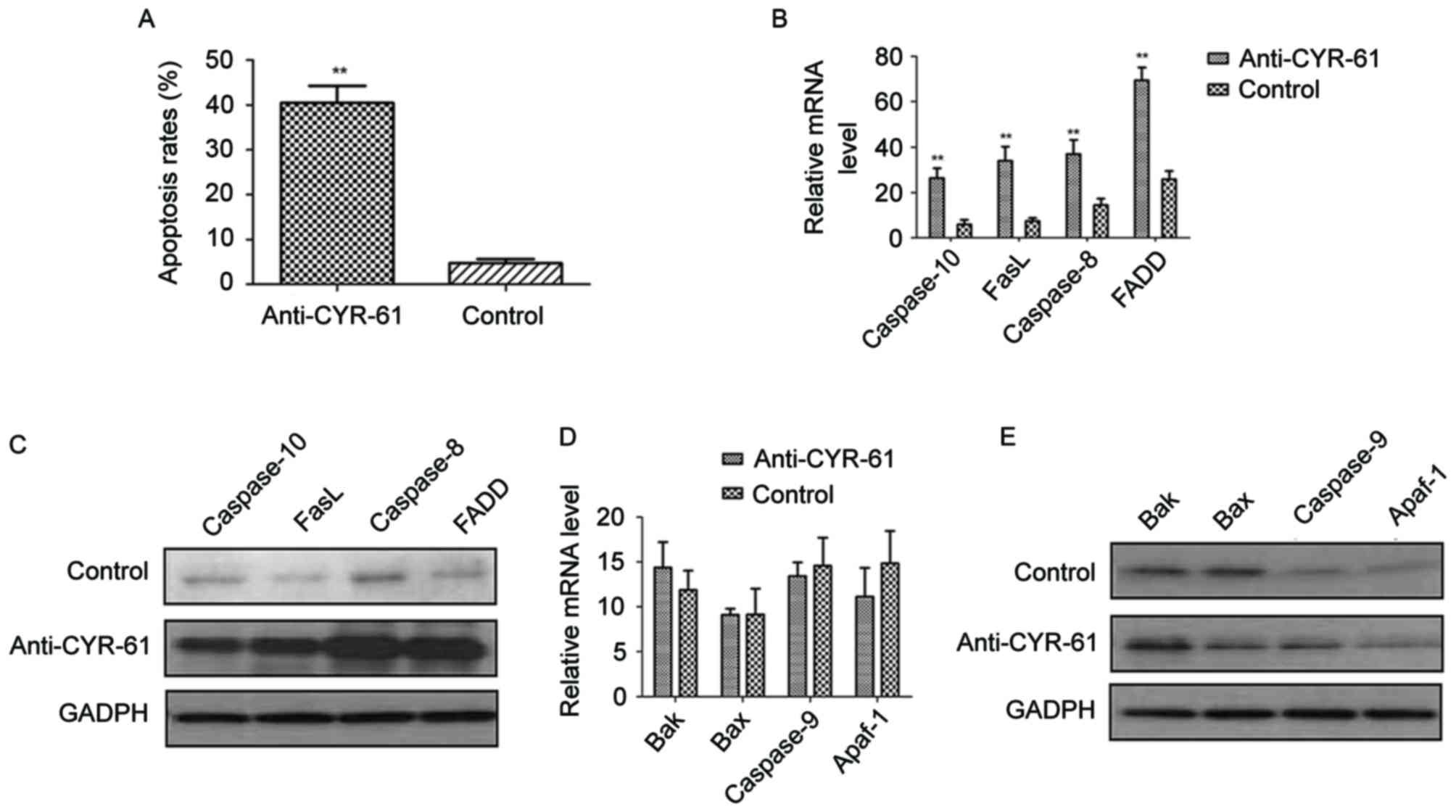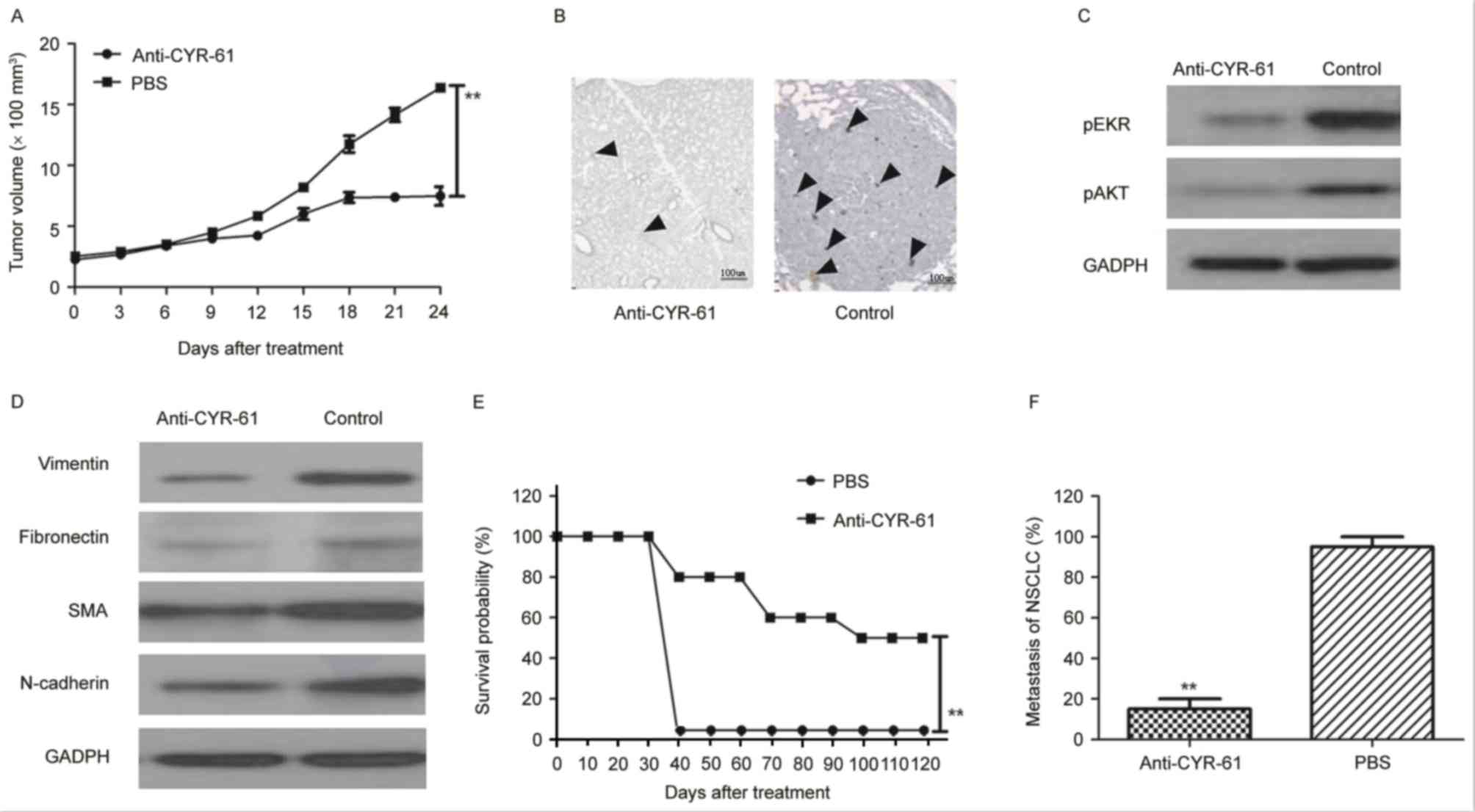|
1
|
Fenton-Ambrose L and Kazerooni EA:
Preventative care: Lung-cancer screens now worth the cost. Nature.
514:352014. View
Article : Google Scholar : PubMed/NCBI
|
|
2
|
Awad R and Nott L: Radiation recall
pneumonitis induced by erlotinib after palliative thoracic
radiotherapy for lung cancer: Case report and literature review.
Asia Pac J Clin Oncol. 12:91–95. 2016. View Article : Google Scholar : PubMed/NCBI
|
|
3
|
Jiang SY, Zhao J, Wang MZ, Huo Z, Zhang J,
Zhong W and Xu Y: Small-cell lung cancer transformation in patients
with pulmonary adenocarcinoma: A case report and review of
literature. Medicine (Baltimore). 95:e27522016. View Article : Google Scholar : PubMed/NCBI
|
|
4
|
Kong R, Feng J, Ma Y, Zhou B, Li S, Zhang
W, Jiang J, Zhang J, Qiao Z, Zhang T, et al: Silencing NACK by
siRNA inhibits tumorigenesis in non-small cell lung cancer via
targeting Notch1 signaling pathway. Oncol Rep. 35:2306–2314. 2016.
View Article : Google Scholar : PubMed/NCBI
|
|
5
|
Brody H: Lung cancer. Nature. 513:S12014.
View Article : Google Scholar : PubMed/NCBI
|
|
6
|
Moro-Sibilot D, Smit E, de Castro Carpeño
J, Lesniewski-Kmak K, Aerts JG, Villatoro R, Kraaij K, Nacerddine
K, Dyachkova Y, Smith KT, et al: Non-small cell lung cancer
patients with brain metastases treated with first-line
platinum-doublet chemotherapy: Analysis from the European FRAME
study. Lung Cancer. 90:427–432. 2015. View Article : Google Scholar : PubMed/NCBI
|
|
7
|
Barnett SA, Downey RJ, Zheng J, Plourde G,
Shen R, Chaft J, Akhurst T, Park BJ and Rusch VW: Utility of
routine PET imaging to predict response and survival after
induction therapy for non-small cell lung cancer. Ann Thorac Surg.
101:1052–1059. 2016. View Article : Google Scholar : PubMed/NCBI
|
|
8
|
Xie FJ, Lu HY, Zheng QQ, Qin J, Gao Y,
Zhang YP, Hu X and Mao W: The clinical pathological characteristics
and prognosis of FGFR1 gene amplification in non-small-cell lung
cancer: A meta-analysis. Onco Targets Ther. 9:171–181. 2016.
View Article : Google Scholar : PubMed/NCBI
|
|
9
|
Lim SH, Sun JM, Lee SH, Ahn JS, Park K and
Ahn MJ: Pembrolizumab for the treatment of non-small cell lung
cancer. Expert Opin Biol Ther. 16:397–406. 2016. View Article : Google Scholar : PubMed/NCBI
|
|
10
|
Müller B, Bovet M, Yin Y, Stichel D, Malz
M, González-Vallinas M, Middleton A, Ehemann V, Schmitt J, Muley T,
et al: Concomitant expression of far upstream element (FUSE)
binding protein (FBP) interacting repressor (FIR) and its splice
variants induce migration and invasion of non-small cell lung
cancer (NSCLC) cells. J Pathol. 237:390–401. 2015. View Article : Google Scholar : PubMed/NCBI
|
|
11
|
Zhao Q, Yue J, Zhang C, Gu X, Chen H and
Xu L: Inactivation of M2 AChR/NF-κB signaling axis reverses
epithelial-mesenchymal transition (EMT) and suppresses migration
and invasion in non-small cell lung cancer (NSCLC). Oncotarget.
6:29335–29461. 2015. View Article : Google Scholar : PubMed/NCBI
|
|
12
|
Zhang H, Zhu X, Li N, Li D, Sha Z, Zheng X
and Wang H: miR-125a-3p targets MTA1 to suppress NSCLC cell
proliferation, migration, and invasion. Acta Biochim Biophys Sin
(Shanghai). 47:496–503. 2015. View Article : Google Scholar : PubMed/NCBI
|
|
13
|
Roth MT, Ivey JL, Esserman DA, Crisp G,
Kurz J and Weinberger M: Individualized medication assessment and
planning: Optimizing medication use in older adults in the primary
care setting. Pharmacotherapy. 33:787–797. 2013. View Article : Google Scholar : PubMed/NCBI
|
|
14
|
Lin Y, Xu T, Tian G and Cui M:
Cysteine-rich, angiogenic inducer, 61 expression in patients with
ovarian epithelial carcinoma. J Int Med Res. 42:300–306. 2014.
View Article : Google Scholar : PubMed/NCBI
|
|
15
|
Xu ST, Ding X, Ni QF and Jin SJ: Targeting
MACC1 by RNA interference inhibits proliferation and invasion of
bladder urothelial carcinoma in T24 cells. Int J Clin Exp Pathol.
8:7937–7944. 2015.PubMed/NCBI
|
|
16
|
Han S, Bui NT, Ho MT, Kim YM, Cho M and
Shin DB: Dexamethasone inhibits TGF-β1-induced cell migration by
regulating the ERK and AKT pathways in human colon cancer cells via
CYR61. Cancer Res Treat. 48:1141–1153. 2016. View Article : Google Scholar : PubMed/NCBI
|
|
17
|
Osaki M, Inaba A, Nishikawa K, Sugimoto Y,
Shomori K, Inoue T, Oshimura M and Ito H: Cysteine-rich protein 61
suppresses cell invasion via down-regulation of matrix
metalloproteinase-7 expression in the human gastric carcinoma cell
line MKN-45. Mol Med Rep. 3:711–715. 2010. View Article : Google Scholar : PubMed/NCBI
|
|
18
|
Hviid CV, Erdem JS, Kunke D, Ahmed SM,
Kjeldsen SF, Wang YY, Attramadal H and Aasen AO: The matri-cellular
proteins ‘cysteine-rich, angiogenic-inducer, 61’ and ‘connective
tissue growth factor’ are regulated in experimentally-induced
sepsis with multiple organ dysfunction. Innate Immun. 18:717–726.
2012. View Article : Google Scholar : PubMed/NCBI
|
|
19
|
Ito T, Hiraoka S, Kuroda Y, Ishii S, Umino
A, Kashiwa A, Yamamoto N, Kurumaji A and Nishikawa T: Effects of
schizophrenomimetics on the expression of the CCN1 (CYR 61) gene
encoding a matricellular protein in the infant and adult neocortex
of the mouse and rat. Int J Neuropsychopharmacol. 10:717–725. 2007.
View Article : Google Scholar : PubMed/NCBI
|
|
20
|
Sabile AA, Arlt MJ, Muff R, Bode B,
Langsam B, Bertz J, Jentzsch T, Puskas GJ, Born W and Fuchs B:
Cyr61 expression in osteosarcoma indicates poor prognosis and
promotes intratibial growth and lung metastasis in mice. J Bone
Miner Res. 27:58–67. 2012. View
Article : Google Scholar : PubMed/NCBI
|
|
21
|
Aoki M and Fujishita T: Oncogenic roles of
the PI3K/AKT/mTOR axis. Curr Top Microbiol Immunol. 407:153–189.
2017.PubMed/NCBI
|
|
22
|
Chen X, Cheng H, Pan T, Liu Y, Su Y, Ren
C, Huang D, Zha X and Liang C: mTOR regulate EMT through RhoA and
Rac1 pathway in prostate cancer. Mol Carcinog. 54:1086–1095. 2015.
View Article : Google Scholar : PubMed/NCBI
|
|
23
|
Risolino M, Mandia N, Iavarone F, Dardaei
L, Longobardi E, Fernandez S, Talotta F, Bianchi F, Pisati F,
Spaggiari L, et al: Transcription factor PREP1 induces EMT and
metastasis by controlling the TGF-β-SMAD3 pathway in non-small cell
lung adenocarcinoma. Proc Natl Acad Sci USA. 111:E3775–E3784. 2014.
View Article : Google Scholar : PubMed/NCBI
|
|
24
|
Bai F, Tian H, Niu Z, Liu M, Ren G, Yu Y,
Sun T, Li S and Li D: Chimeric anti-IL-17 full-length monoclonal
antibody is a novel potential candidate for the treatment of
rheumatoid arthritis. Int J Mol Med. 33:711–721. 2014. View Article : Google Scholar : PubMed/NCBI
|
|
25
|
Livak KJ and Schmittgen TD: Analysis of
relative gene expression data using real-time quantitative PCR and
the 2(-Delta Delta C(T)) method. Methods. 25:402–408. 2001.
View Article : Google Scholar : PubMed/NCBI
|
|
26
|
Zhuang T, Djemil T, Qi P, Magnelli A,
Stephans K, Videtic G and Xia P: Dose calculation differences
between Monte Carlo and pencil beam depend on the tumor locations
and volumes for lung stereotactic body radiation therapy. J Appl
Clin Med Phys. 14:40112013. View Article : Google Scholar : PubMed/NCBI
|
|
27
|
Lu TS, Yiao SY, Lim K, Jensen RV and Hsiao
LL: Interpretation of biological and mechanical variations between
the Lowry versus Bradford method for protein quantification. N Am J
Med Sci. 2:325–328. 2010.PubMed/NCBI
|
|
28
|
Jang BI and Hwang MJ: Do esophageal
squamous cell carcinoma patients have an increased risk of
coexisting colorectal neoplasms? Gut Liver. 10:6–7. 2016.
View Article : Google Scholar : PubMed/NCBI
|
|
29
|
Kulkarni S, Vella ET, Coakley N, Cheng S,
Gregg R, Ung YC and Ellis PM: The use of systemic treatment in the
maintenance of patients with non-small cell lung cancer: A
systematic review. J Thorac Oncol. 11:989–1002. 2016. View Article : Google Scholar : PubMed/NCBI
|
|
30
|
Yoshiba S, Jansen M, Matsushima N, Chen S
and Mendell J: Population pharmacokinetic analysis of patritumab, a
HER3 inhibitor, in subjects with advanced non-small cell lung
cancer (NSCLC) or solid tumors. Cancer Chemother Pharmacol.
77:987–996. 2016. View Article : Google Scholar : PubMed/NCBI
|
|
31
|
Weller A, O'Brien MER, Ahmed M, Popat S,
Bhosle J, McDonald F, Yap TA, Du Y, Vlahos I and deSouza NM:
Mechanism and non-mechanism based imaging biomarkers for assessing
biological response to treatment in non-small cell lung cancer. Eur
J Cancer. 59:65–78. 2016. View Article : Google Scholar : PubMed/NCBI
|
|
32
|
Rossi A and Di Maio M: Platinum-based
chemotherapy in advanced non-small-cell lung cancer: Optimal number
of treatment cycles. Expert Rev Anticancer Ther. 16:653–660. 2016.
View Article : Google Scholar : PubMed/NCBI
|
|
33
|
Sabile AA, Arlt MJ, Muff R, Husmann K,
Hess D, Bertz J, Langsam B, Aemisegger C, Ziegler U, Born W and
Fuchs B: Caprin-1, a novel Cyr61-interacting protein, promotes
osteosarcoma tumor growth and lung metastasis in mice. Biochim
Biophys Acta. 1832:1173–1182. 2013. View Article : Google Scholar : PubMed/NCBI
|
|
34
|
Chen J, Song Y, Yang J, Gong L, Zhao P,
Zhang Y and Su H: The up-regulation of cysteine-rich protein 61
induced by transforming growth factor beta enhances osteosarcoma
cell migration. Mol Cell Biochem. 384:269–277. 2013. View Article : Google Scholar : PubMed/NCBI
|
|
35
|
Wong WR, Chen YY, Yang SM, Chen YL and
Horng JT: Phosphorylation of PI3K/Akt and MAPK/ERK in an early
entry step of enterovirus 71. Life Sci. 78:82–90. 2005. View Article : Google Scholar : PubMed/NCBI
|
|
36
|
Lee YJ, Lee DM and Lee SH: Production of
Cyr61 protein is modulated by extracellular acidification and
PI3K/Akt signaling in prostate carcinoma PC-3 cells. Food Chem
Toxicol. 58:169–176. 2013. View Article : Google Scholar : PubMed/NCBI
|
|
37
|
Shelton JG, Steelman LS, Lee JT, Knapp SL,
Blalock WL, Moye PW, Franklin RA, Pohnert SC, Mirza AM, McMahon M
and McCubrey JA: Effects of the RAF/MEK/ERK and PI3K/AKT signal
transduction pathways on the abrogation of cytokine-dependence and
prevention of apoptosis in hematopoietic cells. Oncogene.
22:2478–2492. 2003. View Article : Google Scholar : PubMed/NCBI
|















